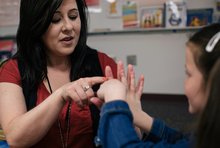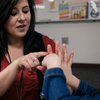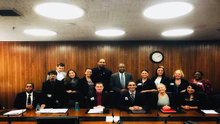0
Report
Community:
Apr 10, 2024
In this new report, The Children’s Equity Project and the Equity Research Action Coalition review the impacts of several social policies across health, education, housing, and income/wealth- on Black children and families.
This report advances the Black Child National Agenda, developed in 2021 by the Equity Research Action Coalition and other partners, by examining major policies and programs in the United States that impact the lives of Black children and families. It is critical to identify policies that can protect Black children and families from harm and trauma; promote their health, wealth, and access to educational excellence; and preserve their cultural heritage, language institutions, and healthy racial identity.
Authored by: Catherine, E., Alexander, B., Iruka, I.U., Meek, S., & Edwards, M.C. (April, 2024). Review of Policy Effects on Black Families and Children: Advancing the Black Child National Agenda. Equity Research Action Coalition at UNC Frank Porter Graham Child Devel
Topics: Advocacy, Child welfare, Early childhood, Racial inequalities
 Shared by Molli Caite Hughes
Shared by Molli Caite Hughes
Molli Caite Hughes posted a
on Apr 10, 2024
Catherine, E., Alexander, B., Iruka, I.U., Meek, S., & Edwards, M.C. (April, 2024). Review of Policy Effects on Black Families and Children: Advancing the Black Child National Agenda. Equity Research Action Coalition at UNC Frank Porter Graham Child Devel
In this new report, The Children’s Equity Project and the Equity Research Action Coalition review the impacts of several social policies across health, education, housing, and income/wealth- on Black children and families.
This report advances the Black Child National Agenda, developed in 2021 by
0
Report
Community:
Nov 17, 2022
Homelessness is a traumatic experience with long-term consequences, particularly for infants and toddlers in their most critical stages of development. Yet homelessness among young children is hidden. Lack of shelter, fear of having children removed from parental custody, and restrictive eligibility criteria for housing programs mean that most young children experiencing homelessness stay in places that are not easily identified.
To this end, SchoolHouse Connection and Poverty Solutions at the University of Michigan analyzed data from twenty states that have formed broad-based coalitions to move prenatal-to-3 priorities forward.
This report describes the prevalence of homelessness among infants and toddlers in these twenty states; gaps in access to early learning programs; and recommendations for increasing enrollment and support.
Authored by: School House Connection
Topics: Child welfare, COVID-19, Early childhood, Education, Foster care, Homelessness, Legislation & Policy, Pre-natal, Racial inequalities, Research, Youth
 Shared by Sandra Ware
Shared by Sandra Ware
Sandra Ware posted a
on Nov 17, 2022
Homelessness is a traumatic experience with long-term consequences, particularly for infants and toddlers in their most critical stages of development. Yet homelessness among young children is hidden.
0
Report
Community:
Sep 22, 2022
New research from Urban Institute housing experts explores the characteristics of youth and young adults living in federally assisted housing and the neighborhoods in which they live. Stable housing is essential for young people as they transition from adolescence to adulthood, and public housing agencies often play a critical role in providing them with affordable homes. In 2021 alone, 755,000 youth (people ages 14 to 18) and 513,000 young adults (people ages 19 to 25) received federal housing assistance. Youth and young adult heads of household in federally assisted housing tend to have extremely low incomes. They are less likely to live in metropolitan areas, and 11 percent were experiencing homelessness at the time of their admission into housing. Little information is available about these young people and their experiences accessing stable and affordable housing, and this brief demonstrates that more work must be done to guide service providers, advocates, and policymakers to strengthen supports and services.
If you have questions or would like to speak with the research team, please email me at aelsbree@urban.org.
Authored by: Olivia Fiol, Matthew Gerken, Susan J. Popkin, and Abby Boshart for THE URBAN INSTITUTE
Topics: Child welfare, Housing, Stability, Youth
 Shared by Sandra Ware
Shared by Sandra Ware
Sandra Ware posted a
on Oct 4, 2022
Olivia Fiol, Matthew Gerken, Susan J. Popkin, and Abby Boshart for THE URBAN INSTITUTE
New research from Urban Institute housing experts explores the characteristics of youth and young adults living in federally assisted housing and the neighborhoods in which they live.
0
Report
Community:
Jun 29, 2022
Looking largely at the 2020-2021 school year, the report is chock-full of information about how schools apply research-based strategies in a variety of different contexts – from very different school systems across multiple states – to make research translate into positive experiences and outcomes for students and their teachers in three critical areas:
• Instructional work, where math or English-language-arts teams, including instructional coaches, special-education teachers, and English learner/multilingual teachers, work to improve the quality of instruction within classrooms.
• Early Warning and Response strategies, where grade-level or cross-functional teams work to create more supportive school environments, where young people are connected to adults, each other, and the school community.
• Well-Matched Postsecondary initiatives, where school-based teams of counselors, service providers, district and school leaders, teachers, and other staff band together to implement evidence-based strategies and processes that support postsecondary application, enrollment, and persistence.
At its heart, improvement is about learning. Each of these networks study their own work, and consistently and strategically make adaptations to increase their effectiveness as the organizational hub supporting schools. And they demonstrate how lessons need not fade away, but when codified, systematized, and shared, they can deepen our collective capacity to accelerate the field’s learning and growth.
Authored by:
Topics: Advocacy, Attendance, Child welfare, CLPHA, Community development, Education, Grade-level proficiency, Housing, Literacy, Low-income, Partnerships, Place-based, Supportive housing, Sustainability, Youth
 Shared by Karina George
Shared by Karina George
Karina George posted a
on Jun 29, 2022
Looking largely at the 2020-2021 school year, the report is chock-full of information about how schools apply research-based strategies in a variety of different contexts – from very different school systems across multiple states – to make research translate into positive experiences and outcomes f
0
Report
Community:
Jun 27, 2022
We have an abundance of talent that is ready to reimagine early childhood and well-being in America for our youngest children and families, but we do not have an abundance of leadership experiences that nurture, propel, and position them as the dynamic leaders our country urgently needs.
Leadership that reflects the full diversity and genius of our communities, sectors, identities, and lived experiences matters now more than ever. In Toward A More Equitable Tomorrow: A Landscape Analysis of Early Childhood Leadership, we uncover the essentials for future leadership investments that value and center equity—especially racial equity and inclusion—to surface new possibilities and equitable prosperity moving forward. Insights from stakeholders including state and federal cabinet directors, service providers, funders, and parents offer powerful perspectives to guide the future early childhood field, and guide those who seek to accelerate families’ well-being, educational success, and economic mobility.
Ascend at the Aspen Institute is embracing this moment as a renewal, and also as a redoubling of our commitment to remake our systems and our society. This means centering children and families with a focus not simply on eliminating persistent inequities such as poverty, polarization, and racism, but on ensuring pathways to prosperity and well-being.
With support from the Buffett Early Childhood Fund, David and Lucile Packard Foundation, and the Bezos Family Foundation, Ascend undertook a robust landscape analysis of the early childhood field. More than 80 leaders—from research, practice, policy, philanthropy, and families with young children—shared their insights for this report. It was augmented by a review of 20 mission-aligned leadership efforts. Our inquiry was grounded in an intentional focus on racial, economic, and gender equity; respect for the advances made; commitment to innovation; and an open mind to new approaches, possibilities, and power.
Authored by: Ascend at the Aspen Institute
Topics: Advocacy, Asset building, Child welfare, CLPHA, Early childhood, Housing, Legislation & Policy, Racial inequalities, Research, Supportive housing, Sustainability, Youth
 Shared by Karina George
Shared by Karina George
Karina George posted a
on Jun 27, 2022
Ascend at the Aspen Institute
We have an abundance of talent that is ready to reimagine early childhood and well-being in America for our youngest children and families, but we do not have an abundance of leadership experiences that nurture, propel, and position them as the dynamic leaders our country urgently needs.
0
Report
Community: Youth
Dec 1, 2020
420,000.
Based on the new report, "Lost in the Masked Shuffle & Virtual Void: Children and Youth Experiencing Homelessness Amidst the Pandemic" from SchoolHouse Connection and Poverty Solutions at the University of Michigan, that’s how many fewer children and youth experiencing homelessness have been identified and enrolled by schools so far this school year.
According to our data and insights - gathered from educators and homeless liaisons across 49 states - the number of children, youth, and families experiencing homelessness has likely increased due to the economic crisis. Yet, because of COVID-19 challenges in identifying children and youth experiencing homelessness, hundreds of thousands may not be getting the education and support they need - from internet access, to housing, to food, to child care.
What’s more, only 18% of respondents indicated that federal coronavirus relief education funding provided by the CARES Act is being used to meet the needs of students experiencing homelessness.
To break generational cycles of homelessness, we must take swift action to support the increasing number of children, youth, and families in need. Check out our report to learn more and take action. We have included recommendations for Congressional leaders, state and local educational agencies, homeless, housing, food, and other relief agencies, and philanthropic organizations.
Authored by: Poverty Solutions at THE UNIVERSITY OF MICHIGAN & SCHOOLHOUSE CONNECTION
Topics: Attendance, Child welfare, Early childhood, Education, Funding, Health, Homelessness, Low-income, Stability, Youth
 Shared by Housing Is
Shared by Housing Is
Housing Is posted a
on Dec 1, 2020
Poverty Solutions at THE UNIVERSITY OF MICHIGAN & SCHOOLHOUSE CONNECTION
0
News Article
Community: Youth
Feb 1, 2018
Chicago’s troubling homicide rate could be significantly reduced through a massive increase in state spending for Chicago schools. That's just one of the proposals floated Monday by a prominent University of Chicago economist Jens Ludwig. With a substantial commitment, he says homicides could be reduced by nearly 60 percent. Illinois is dead last when it comes to the percentage of education dollars provided by the state to its cities. Ludwig believes adding $1.7 billion dollars would not only bring Illinois up to the national average, but could substantially reduce gun violence as well. Given the social science evidence on the link between high school graduation and gun violence, that would be about a 30 percent decrease in the homicide rates in the city of Chicago for something that has absolutely nothing to do with the city of Chicago policies.
Authored by: FOX 32 CHICAGO
Topics: Child welfare, Community development, Education, Funding, Legislation & Policy, Preventative care, Youth
 Shared by Housing Is
Shared by Housing Is
Housing Is posted a
on Oct 15, 2020
Chicago’s troubling homicide rate could be significantly reduced through a massive increase in state spending for Chicago schools. That's just one of the proposals floated Monday by a prominent University of Chicago economist Jens Ludwig.
0
News Article
Community: Youth
Jun 29, 2017
One Summer Chicago Plus is a jobs program designed to reduce violence and prepare youth living in some of the city’s highest-violence neighborhoods for the labor market. This study was carried out over the summer of 2013 in partnership with the Chicago Department of Family and Support Services. It found that the program, which provided a six-week, minimum-wage job for 25 hours a week, reduced the number of violent-crime arrests for participants by 33 percent over the subsequent year. The One Summer Chicago Plus 2013 study—accompanied by a long-term follow-up of the 2012 program—closely examines the two to three years following the six-week program and finds that the reduction in violent-crime arrests is not driven simply by keeping participants off the streets during the summer. In fact, the decline in violence remains significant when the summer is ignored entirely.
Researchers did find, however, that the program had no significant impacts on schooling outcomes or engagement, nor did it have a positive impact on formal labor sector employment for all of the participants after the fact. The authors do note that it is possible that significant labor market effects will develop past the three-year window examined in the study.
Authored by: UNIVERSITY OF CHICAGO URBAN LABS
Topics: Child welfare, Community development, Criminal justice, Out-of-school time, Partnerships, Preventative care, Safety, Youth
 Shared by Housing Is
Shared by Housing Is
Housing Is posted a
on Oct 15, 2020
UNIVERSITY OF CHICAGO URBAN LABS
One Summer Chicago Plus is a jobs program designed to reduce violence and prepare youth living in some of the city’s highest-violence neighborhoods for the labor market. This study was carried out over the summer of 2013 in partnership with the Chicago Department of Family and Support Services.
0
Report
Community:
Nov 7, 2019
How Housing Programs Can Support the Educational Needs of Children Living in Publicly Supported Homes
Authored by: Public and Affordable Housing Research Corporation
Topics: Attendance, Broadband, Child welfare, Early childhood, Health, Housing, Literacy, Low-income, Out-of-school time, Partnerships, Place-based, Research, School-readiness
 Shared by Kelly McElwain
Shared by Kelly McElwain
Kelly McElwain posted a
on Nov 7, 2019
Public and Affordable Housing Research Corporation
How Housing Programs Can Support the Educational Needs of Children Living in Publicly Supported Homes
0
News Article
Community:
Jun 12, 2019
About half of the student body at one Ohio elementary school has witnessed drug use at home. Educators spend time every day teaching the children how to cope.
Authored by: Dan Levin for The New York Times
Topics: Child welfare, Early childhood, Education, Health, Substance abuse, Youth
 Shared by Housing Is
Shared by Housing Is
Housing Is posted a
on Jun 13, 2019
Dan Levin for The New York Times
About half of the student body at one Ohio elementary school has witnessed drug use at home. Educators spend time every day teaching the children how to cope.
0
News Article
Community:
Jun 5, 2019
In the United States, more than 2.7 million grandparents report that they’re primarily responsible for their grandchildren under 18. The problem is many are struggling with food insecurity because of federal rules and regulations.
Authored by: Marie C. Gualtieri for Next Avenue
Topics: Child welfare, Food insecurity, Legislation & Policy, Low-income, Nutrition
 Shared by Housing Is
Shared by Housing Is
Housing Is posted a
on Jun 11, 2019
Marie C. Gualtieri for Next Avenue
In the United States, more than 2.7 million grandparents report that they’re primarily responsible for their grandchildren under 18. The problem is many are struggling with food insecurity because of federal rules and regulations.
0
Report
Community:
May 1, 2019
Community eligibility allows high-poverty schools and school districts to offer free meals to all students, and it eliminates the need for household school meal applications. A key piece of the Healthy, Hunger-Free Kids Act of 2010, community eligibility was phased in a few states at a time before it was made available to schools nationwide in the 2014–2015 school year.
Authored by: Food Research & Action Center (FRAC)
Topics: Child welfare, Education, Food insecurity, Legislation & Policy, Low-income, Nutrition, Out-of-school time, Research
 Shared by Housing Is
Shared by Housing Is
Housing Is posted a
on Jun 3, 2019
Food Research & Action Center (FRAC)
Community eligibility allows high-poverty schools and school districts to offer free meals to all students, and it eliminates the need for household school meal applications.
0
Report
Community:
Apr 25, 2019
Access to affordable child care can be a major barrier for low-income parents who want to participate in education and training activities to gain skills or obtain employment. Child care assistance from the Child Care and Development Fund (CCDF), the federal block grant that funds states to provide child care assistance to low-income families, can help alleviate this barrier and make it easier for low-income parents to participate in activities that improve their skills and lead to stable employment with adequate pay. However, the CCDF eligibility requirements and priorities for service are set at the state level, and states make different decisions about how to allocate scarce CCDF resources, so access to and use of CCDF subsidies for parents seeking education and training varies across states.
Authored by: Semhar Gebrekristos and Gina Adams for The Urban Institute
Topics: Child welfare, Early childhood, Education, Legislation & Policy, Post-secondary, Research, Workforce development
 Shared by Housing Is
Shared by Housing Is
Housing Is posted a
on May 30, 2019
Semhar Gebrekristos and Gina Adams for The Urban Institute
Access to affordable child care can be a major barrier for low-income parents who want to participate in education and training activities to gain skills or obtain employment.
0
News Article
Community:
Mar 18, 2019
It’s a prescription guaranteed to develop healthy brains, refine motor skills and prepare kids for school, doctors say. But few parents expect a physician to hand their children a book at their first wellness checkup at Nationwide Children’s Hospital in Columbus.
Authored by: Alissa Widman Neese for The Columbus Dispatch
Topics: Child welfare, Early childhood, Education, Health, Literacy, Low-income, Partnerships
 Shared by Housing Is
Shared by Housing Is
Housing Is posted a
on May 30, 2019
Alissa Widman Neese for The Columbus Dispatch
It’s a prescription guaranteed to develop healthy brains, refine motor skills and prepare kids for school, doctors say. But few parents expect a physician to hand their children a book at their first wellness checkup at Nationwide Children’s Hospital in Columbus.
0
Report
Community:
May 1, 2019
Child poverty is an urgent and preventable crisis. Solutions to child poverty already exist if we just expand and invest in them. Benefits like nutrition assistance, housing vouchers and tax credits helped lift nearly 7 million children out of poverty in 2017, but millions of children were left behind due to inadequate funding, eligibility restrictions and low wages. We can and must fix these problems to help more children escape poverty now.
Authored by: Children's Defense Fund
Topics: Child welfare, Dual-generation, Early childhood, Food insecurity, Funding, Housing, Legislation & Policy, Low-income, Research, Workforce development
 Shared by Housing Is
Shared by Housing Is
Housing Is posted a
on May 28, 2019
Child poverty is an urgent and preventable crisis. Solutions to child poverty already exist if we just expand and invest in them.
0
Report
Community:
Dec 11, 2018
This report highlights the development and implementation of a mentoring program for college students in foster care in New York City through a strategic partnership that was forged among New York City’s Administration for Children’s Services, Goldman Sachs and Casey Family Programs. The program is designed to expose youth to professional and experiential opportunities through a series of one-on-one meetings and group workshops. Students have the opportunity to become familiar with the Goldman Sachs corporate environment, understand various business sectors and explore the roles and responsibilities of different jobs, as well as receive hands-on support with job applications and interviewing.
Authored by: Casey Family Programs
Topics: Child welfare, Foster care, Partnerships, Research, Workforce development, Youth
 Shared by Housing Is
Shared by Housing Is
Housing Is posted a
on May 21, 2019
This report highlights the development and implementation of a mentoring program for college students in foster care in New York City through a strategic partnership that was forged among New York City’s Administration for Children’s Services, Goldman Sachs and Casey Family Programs.
0
Report
Community:
Apr 1, 2019
This much-needed, thorough review of the existing scholarship on what is known (and still unknown) about the relationship between residential segregation and various outcomes for immigrants, is an important foundation on which to build inclusive, equitable housing and school policies.
Authored by: Martha Cecilia Bottia for Poverty and Race Research Action Council
Topics: Child welfare, Housing, Immigrants, Research
 Shared by Housing Is
Shared by Housing Is
Housing Is posted a
on May 10, 2019
Martha Cecilia Bottia for Poverty and Race Research Action Council
This much-needed, thorough review of the existing scholarship on what is known (and still unknown) about the relationship between residential segregation and various outcomes for immigrants, is an important foundation on which to build inclusive, equitable housing and school policies.
0
Report
Community:
Recent research has begun to focus on the impact of housing instability, in its many forms, on child health and development. It is hypothesized that young children are at greater risk of adverse effects of living environments, as this time period serves as a critical window for establishing socialization and learning habits. Additionally, the effects of housing instability may be compounded when combined with other challenges faced by low-income families, such as lack of resources. Previous studies have found that housing instability is associated with deficits in overall academic achievement, emotional regulation, and verbal abilities.
Authored by: International Public Health Journal
Topics: Child welfare, Education, Health, Homelessness, Housing, Research
 Shared by Housing Is
Shared by Housing Is
Housing Is posted a
on May 9, 2019
International Public Health Journal
Recent research has begun to focus on the impact of housing instability, in its many forms, on child health and development.
0
News Article
Community:
Apr 4, 2019
The nonprofit LIFT Orlando and AdventHealth have started construction on a “first of its kind” early learning center in the long-neglected West Lakes neighborhood south of Camping World Stadium, with an opening expected by August. The center will provide basic education as well as health and wellness programs, an on-site doctor or advanced nurse practitioner, mental health counseling and other services beyond the classroom. It can enroll up to 220 children from age 6 weeks to 5 years, with half of the openings reserved for kids from the West Lakes area, who will be accepted regardless of their families’ ability to pay.
Authored by: Kate Santich for Orland Sentinel
Topics: Child welfare, Early childhood, Education, Health, Low-income, Partnerships, Place-based
 Shared by Housing Is
Shared by Housing Is
Housing Is posted a
on Apr 4, 2019
Kate Santich for Orland Sentinel
The nonprofit LIFT Orlando and AdventHealth have started construction on a “first of its kind” early learning center in the long-neglected West Lakes neighborhood south of Camping World Stadium, with an opening expected by August.
0
News Article
Community:
Apr 2, 2019
A group called the Fostering Stable Housing Opportunities (FSHO) Coalition — which includes Callahan’s youth-led ACTION Ohio and the National Center for Housing and Child Welfare — met in early March with Housing and Urban Development (HUD) Secretary Ben Carson to lay out a plan for a $20 million voucher program aimed at preventing homelessness for transition age foster youth. Under that plan, HUD would use an existing pot of money to provide on-demand vouchers and assistance for foster youth who needed stable housing.” HUD is currently reviewing the proposal to determine the agency’s authority to act on it. If the plan moves forward, it could be a game changer for thousands of teens and young adults who age out of foster care each year.
Authored by: John Kelly for The Chronicle of Social Change
Topics: Child welfare, Foster care, Funding, Housing, Legislation & Policy
 Shared by Housing Is
Shared by Housing Is
Housing Is posted a
on Apr 2, 2019
John Kelly for The Chronicle of Social Change
A group called the Fostering Stable Housing Opportunities (FSHO) Coalition — which includes Callahan’s youth-led ACTION Ohio and the National Center for Housing and Child Welfare — met in early March with Housing and Urban Development (HUD) Secretary Ben Carson to lay out a plan for a $20 million vo
0
News Article
Community:
Mar 20, 2019
Low-income immigrant mothers are skipping the chance to get nutritious foods and help for their infants from a federal program because they fear deportation, or the loss of their children, according to the agencies that distribute those benefits.
Authored by: Alfred Lubrano for The Inquirer
Topics: Child welfare, Early childhood, Food insecurity, Health, Legislation & Policy, Nutrition
 Shared by Mica O'Brien
Shared by Mica O'Brien
Mica O'Brien posted a
on Mar 26, 2019
Alfred Lubrano for The Inquirer
Low-income immigrant mothers are skipping the chance to get nutritious foods and help for their infants from a federal program because they fear deportation, or the loss of their children, according to the agencies that distribute those benefits.
0
News Article
Community:
Mar 21, 2019
Reauthorization of the Healthy Hunger-Free Kids Act of 2010 has been stalled since 2015. Even though the Senate Agriculture Committee and the House Education and the Workforce Committee reported their respective bills, the Improving Child Nutrition Integrity and Access Act of 2016 (S. 3136) and the Improving Child Nutrition and Education Act of 2016 (H.R. 5003), neither was acted upon by the full House and Senate. Instead, these programs were extended as part of the FY2016 omnibus appropriations law.
Authored by: Marshall Matz and Roger Szemraj for AgriPulse
Topics: Child welfare, Food insecurity, Funding, Legislation & Policy, Low-income, Nutrition
 Shared by Mica O'Brien
Shared by Mica O'Brien
Mica O'Brien posted a
on Mar 26, 2019
Marshall Matz and Roger Szemraj for AgriPulse
Reauthorization of the Healthy Hunger-Free Kids Act of 2010 has been stalled since 2015. Even though the Senate Agriculture Committee and the House Education and the Workforce Committee reported their respective bills, the Improving Child Nutrition Integrity and Access Act of 2016 (S.
0
News Article
Community:
Mar 18, 2019
The Department of Education reports more than 29,000 kids in North Carolina were considered homeless in the 2016-2017 school year. About three-quarters of those are living with other families because it’s too expensive to live on their own. According to Shantiqua Neely, it’s not necessarily because people don’t have jobs. She’s the executive director at A Child’s Place, the organization helps homeless CMS students and families. She said it’s because rent is too expensive.
Authored by: Alex Olgin for WFAE 90.7
Topics: Child welfare, Education, Homelessness, Housing, Legislation & Policy, Low-income
 Shared by Mica O'Brien
Shared by Mica O'Brien
Mica O'Brien posted a
on Mar 26, 2019
The Department of Education reports more than 29,000 kids in North Carolina were considered homeless in the 2016-2017 school year. About three-quarters of those are living with other families because it’s too expensive to live on their own.
0
News Article
Community:
Mar 13, 2019
Universal meals allow schools to build the program into their overall curriculum, "creating a learning lab for healthy eating and a mealtime experience where every kid is equal and enjoys their meals together," according to Hunger Free Vermont, which says nearly a quarter of schools in the state offer them and studies show that the programs "increase participation, leading to better student health and learning, and a strong school meals business. When participation is up, school meal programs have more resources to invest in even higher quality food, including many local foods."
Authored by: Chris Mays for Brattleboro Reformer
Topics: Child welfare, Education, Food insecurity, Funding, Health, Nutrition
 Shared by Housing Is
Shared by Housing Is
Housing Is posted a
on Mar 19, 2019
Chris Mays for Brattleboro Reformer
Universal meals allow schools to build the program into their overall curriculum, "creating a learning lab for healthy eating and a mealtime experience where every kid is equal and enjoys their meals together," according to Hunger Free Vermont, which says nearly a quarter of schools in the
0
News Article
Community:
Feb 25, 2019
Increasing numbers of young Americans are unfit for military service. So why is the Trump administration rolling back nutrition standards?
Authored by: Dan Glickman for Roll Call
Topics: Child welfare, Food insecurity, Legislation & Policy, Nutrition, Obesity
 Shared by Mica O'Brien
Shared by Mica O'Brien
Mica O'Brien posted a
on Mar 12, 2019
Dan Glickman for Roll Call
Increasing numbers of young Americans are unfit for military service. So why is the Trump administration rolling back nutrition standards?
 Shared by Molli Caite Hughes
on Apr 10, 2024
Shared by Molli Caite Hughes
on Apr 10, 2024
 Shared by Sandra Ware
on Nov 17, 2022
Shared by Sandra Ware
on Nov 17, 2022
 Shared by Sandra Ware
on Oct 4, 2022
Shared by Sandra Ware
on Oct 4, 2022
 Shared by Karina George
on Jun 29, 2022
Shared by Karina George
on Jun 29, 2022
 Shared by Karina George
on Jun 27, 2022
Shared by Karina George
on Jun 27, 2022
 Shared by Housing Is
on Dec 1, 2020
Shared by Housing Is
on Dec 1, 2020
 Shared by Housing Is
on Oct 15, 2020
Shared by Housing Is
on Oct 15, 2020
 Shared by Housing Is
on Oct 15, 2020
Shared by Housing Is
on Oct 15, 2020
 Shared by Kelly McElwain
on Nov 7, 2019
Shared by Kelly McElwain
on Nov 7, 2019

 Shared by Housing Is
on Jun 13, 2019
Shared by Housing Is
on Jun 13, 2019

 Shared by Housing Is
on Jun 11, 2019
Shared by Housing Is
on Jun 11, 2019
 Shared by Housing Is
on Jun 3, 2019
Shared by Housing Is
on Jun 3, 2019
 Shared by Housing Is
on May 30, 2019
Shared by Housing Is
on May 30, 2019
 Shared by Housing Is
on May 30, 2019
Shared by Housing Is
on May 30, 2019
 Shared by Housing Is
on May 28, 2019
Shared by Housing Is
on May 28, 2019
 Shared by Housing Is
on May 21, 2019
Shared by Housing Is
on May 21, 2019
 Shared by Housing Is
on May 10, 2019
Shared by Housing Is
on May 10, 2019
 Shared by Housing Is
on May 9, 2019
Shared by Housing Is
on May 9, 2019

 Shared by Housing Is
on Apr 4, 2019
Shared by Housing Is
on Apr 4, 2019


 Shared by Housing Is
on Apr 2, 2019
Shared by Housing Is
on Apr 2, 2019






 Shared by Housing Is
on Mar 19, 2019
Shared by Housing Is
on Mar 19, 2019






